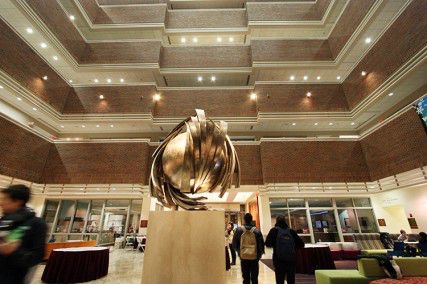
Boston University School of Management jumped both nationally and internationally in the Financial Times’ Global Masters of Business Administration graduate program ranking, according to a Monday press release from SMG.
SMG’s MBA program, which has a 31 percent acceptance rate, ranked 39th among United States MBA programs and 75th internationally in the Financial Times’ 2014 rankings, putting SMG in a position of esteem, said SMG Assistant Dean Steven Davidson. The program jumped five spots internationally and 20 places nationally.
“This ranking is highly viewed in Europe and across the globe, so it’s one of the more global rankings, and to have BU elevate into the top 40 in the United States is exciting,” Davidson said. “It reflects positively on the university and builds off the international strength of BU.”
To be ranked in the top 100 MBA programs is an impressive feat, said Della Bradshaw, business education editor for the Financial Times.
“There are about 12,000 business schools in the world, so to be ranked in the top 100 means that this is certainly an elite group, the 1 percent of the business school population,” she said.
The methodology for the ranking relies on three key components, Bradshaw said.
“They [the rankings] are a snapshot in time of the way business schools and their alumni are performing based on three criteria, which are the career development of the alumni, the international perspective of the business school, and the business schools that are producing the best new ideas,” she said. “So basically, which of the business schools are producing the global managers of the 21st century.
With career success factoring largely into the rankings, SMG restructured the curriculum to better prepare students for the job market, said SMG professor of finance Donald Smith.
“With our MBA program, in the last few years, we got to emphasize … the health sector, digital technology, social enterprise and sustainability,” Smith said. “We reworked the curriculum to get an earlier introduction to these key sectors so that students can identify with one of the sectors and then combine the function of their area, finance or marketing or operations, along with specialization with one of the sectors.
Jay Zagorsky, an economics professor at SMG, said that despite being pleased with the honor, he had some reservations regarding rankings.
“These rankings are designed so that there is movement,” Zagorsky said. “If universities pretty much stay fixed for years on end, then no one will read the Financial Times — no one will care about the article. It’s always sort of like a horse race … There is an inherent bias by the editors of all these lists.”
Despite his hesitation to blindly accept rankings as fact, Zagorsky said ranking highly is an indicator of a high-achieving student body.
“In general, as rankings go up, student quality goes up,” he said. “As a professor, the higher the quality of students, the more fun they are to teach.”
Patrick Dewechter, a second year MBA candidate at SMG, said the school’s unconventional urban environment fosters creativity and encourages students to think outside of the box.
“It is not your sort of conventional business school environment,” Dewechter said. “You get to tackle problems from a number of different perspectives that you maybe wouldn’t have thought of as opposed to your standard, finance-focused, homogenous background business school environment where everyone is competing for the same jobs and talking about the same stuff.”
Trang Nguyen, also an SMG second-year MBA candidate, said the receptiveness of the school is a contributing factor to the higher ranking.
“This can be attributed to Dean [Kenneth] Freeman,” Nguygen said. “He has done a lot of things improving alumni relations, career center, and he listens a lot … The school has been listening to us and I think that is one of the reasons why the ranking has gone up.”




















































































































